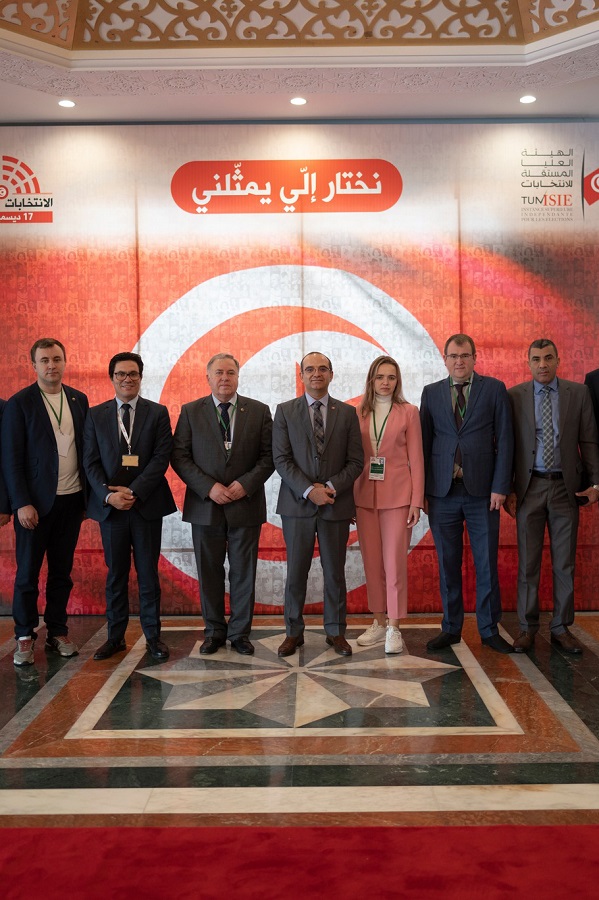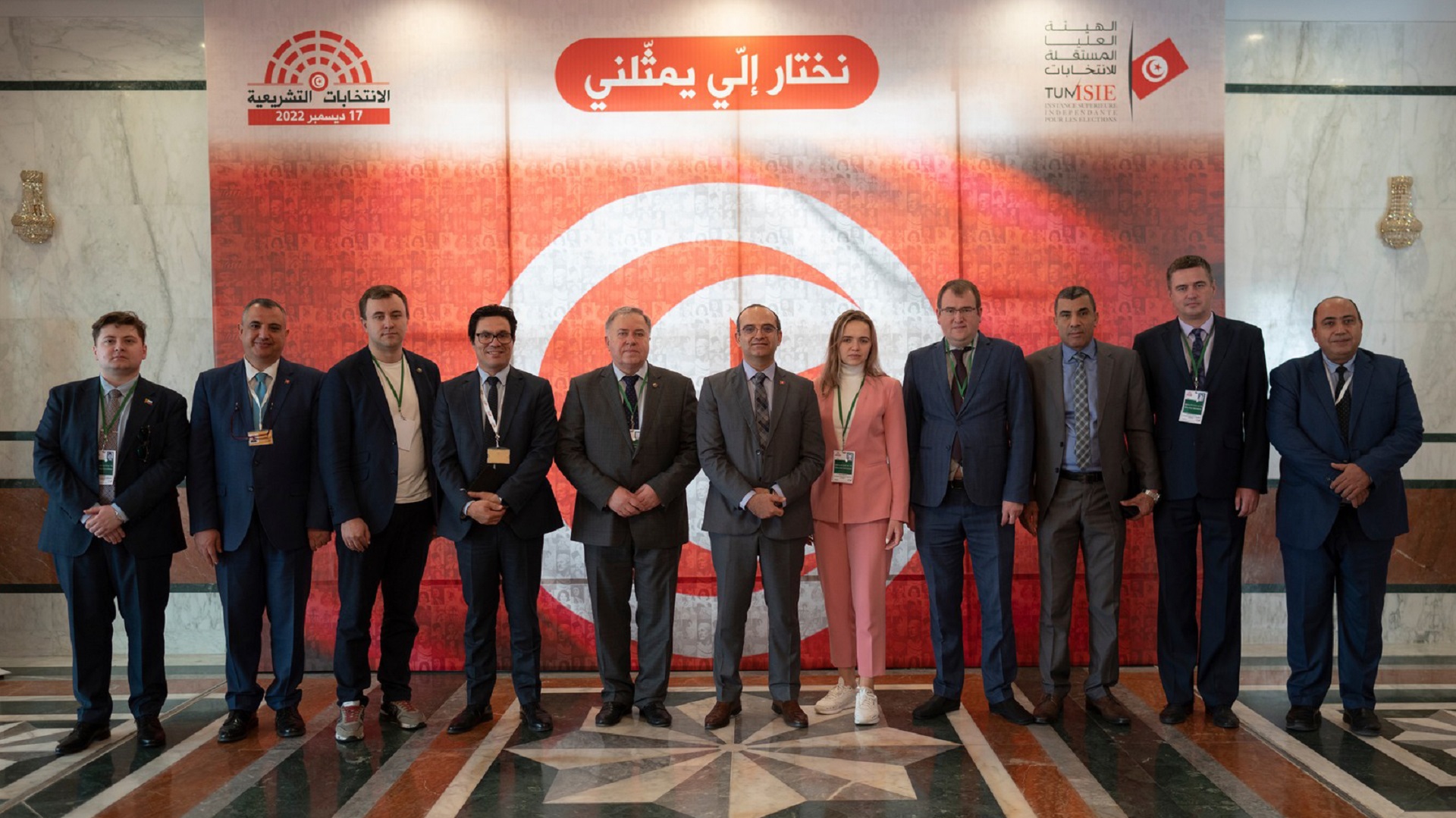Back on December 16, a surprising scene was unfolding at the headquarters of the Independent High Authority for Elections. In the chairs of the reception hall, the president of the government agency Farouk Bouasker and four other members of the organization were seated in front of … a Russian delegation.
Arriving from Moscow the same day, they were members of the Civic Chamber of the Russian Federation, a body that monitors and evaluates public action but has very little power in Vladimir Putin’s regime. Yet they were welcomed with the honors previously reserved to the European Union delegations, and presented with a copy of the new electoral code.
Deployed to Tunisia at the invitation of Farouk Bouasker, close to Tunisia's strongman President Kaïs Saïed, their mission would be to follow and analyze the process of the legislative elections organized the next day. It was the first such meeting since the coup of July 25, 202, when Saied issued an emergency declaration firing the prime minister and assumed all executive power.
It is the first ever delegation of this kind sent by Russia in the country. If their mission doesn’t differ from that of their European predecessors, the context of their coming is far from trivial.


The delegation of Russian observers received by members of the ISIE, on the eve of the first round of legislative elections in December 2022.
Authoritarian drift
The day before the Russian delegation’s arrival, the European Parliament had published a press release announcing it “would not observe the electoral process” in December 2022, in a break with its usual position: Brussels’ parliamentarians had followed the elections of 2011, 2014, 2018 and 2019.
It was symptomatic of a growing distance between Saïed and his Western partners, who are increasingly questioning the Head of State’s management of the country. Already in July 2022, the head of American diplomacy Antony Blinken said he was preoccupied by “the erosion of the respect of democratic standards” in Tunisia, following the low turnout recorded for the referendum on the new constitution project.
Over the months, criticism of Saïed’s authoritarianism has multiplied on the American side, but also in Europe: the German government, for example, declared itself to be “very worried” following the wave of arrests of February 2023, while the European Parliament passed, one month later, a resolution condemning the “authoritarian drift of president Saïed”.
For Slim Laghmani, law professor at the University of Tunis, if the European Union’s position stays the same and no sanctions have yet been made, it’s because Brussels and the member states cannot afford to completely forsake the Tunisian government.
“Generally speaking, when principles and interests come into conflict, interests take the upper hand,” says the professor. “We maintain an in-between position, expressing our concern about political developments in Tunisia, but while making sure to avoid an economic collapse of Tunisia that would destabilize the European Union.”
Moscow's influence in Africa
For its part, the Tunisian government has multiplied its declarations aimed directly at the West, keeping up especially with anti-imperialist rhetoric. In April and May 2022, Kaïs Saïd explained in several declarations that he will fight “any form of interference”, in response to American and European criticism of the referendum organization.
In this context, the rapprochement with new international partners begs several questions. It is not the first time Tunisia is looking for support outside of Europe or the United States: cooperative measures with Saudi Arabia, Qatar or Turkey have, for example, increased in the last few years.
However, maintaining ties with these countries is nowhere near as worrying for the West as a rapprochement with Moscow. Even before the beginning of the war in Ukraine, several European powers - with France at the front - excoriated the growing Russian influence in several African countries. Since the start of the conflict in Europe, the West is alarmed by the complacency with which some African Head of States treat Russia, such as the Malian junta leader Assimi Goïta or South African President Cyril Ramaphosa.
Kaïs Saïed’s Tunisian government has for its part boosted Russia’s place in national diplomacy. The authorities were preparing to welcome his Russian counterpart, Sergey Lavrov, in early February 2023. The visit ended up being canceled at the last minute, officially for security reasons. However, Slim Laghmani recalls that “the press mentioned American pressure on Tunisia”, a theory that the professor considers credible and which alludes to “a preventive act on the part of the U.S.”.
All eyes on Tunis
For the Kremlin, Saïed appears like a new and unique partner from a historical point of view. Officially non-aligned but firmly anti-Soviet under Bourguiba, then openly turned towards the U.S. with Ben Ali, Tunisia has long remained closed to cooperation with Russia.
After the revolution, the relationship timidly deepened. The first official visit of the Russian Minister of Foreign Affairs in Tunis took place in 2014, but no major partnership was established. With Kaïs Saïed, Tunisia is more open than ever to Moscow’s ambitions.
It is worth remembering that Russia has been nurturing projects in the Maghreb for years now, and is already present on the Tunisian border. A strategic partner of Algeria since the Cold War, ties between the two countries show no sign of abating. Russia is also present on the other side of the border, in the eastern part of Libya, where the Warner group mercenaries support Marshal Haftar’s forces.
In the Maghreb and elsewhere, Moscow leans mostly on its military power to seal ties, offering the services of its private military companies, organizing the military training of the partner countries’ armed forces and selling military equipment. Russia thus became the first weapon supplier in Africa in the 2018-2022 period, totaling 40% of weapon imports on the continent.
In Tunisia, the cooperation has yet to take this shape. A military partnership with Russia would lead to a complete paradigm shift and make Moscow a major ally, which is far from being the case at present. “These are choices that cannot be taken lightly,” says Slim Laghmani, for whom such an agreement would be an “extremely serious decision”. But, step by step, Russia discreetly expands its influence in the country.
Culture and tourism
First, culturally, Moscow is working on promoting its image in Tunisia. The Maison Russe in Tunis, for example, a cultural center under the embassy's patronage, focused until recently on organizing Russian language courses. Since last year, it has broadened its activities to other topics and with new frameworks, particularly in schools.
Russian tourists are seen as saviors of the sector.
Since January, the Maison Russe organizes high school visits in Russian-speaking classes. These actions with students obviously help to strengthen academic cooperation, and the Maison Russe also helps students who want to obtain scholarships to study in Russia. “This year, we went from 17 to 40 scholarships granted,” says a translator working for the Maison. The Maison Russe highlights that it is an “apolitical” institution, receiving “few directives” from the embassy.
Another indirect lever of cultural rapprochement is tourism. After the 2015 terrorist attacks and the desertion of hotels by Europeans, Russian tourists are seen as saviors of the sector.
Impacted by the COVID-19 pandemic and then by the closure of almost all foreign trade links at the start of the war in Ukraine, Russian outbound tourism is now in full recovery. The national Russian company Aeroloft has announced the resumption of flights to Tunisia and will be serving the Enfidha-Hammamet airport starting May 30, 2023.
Traditional diplomacy
Moscow can also bank on traditional diplomacy to expand its influence in Russia. From this point of view, the offensive seems much more obvious, especially with the substitution in January 2022 of the former ambassador Sergey Nikolaev.
In the post in Tunis since 2015 but rather discreet, one of his last noteworthy successes was the support of the partnership in the spatial industry between the two countries. One of the highlights of this project was the launch, in March 2021, of Challenge One, the first Tunisian satellite, from the Russia spaceport of Baikonour.
The profile of his substitute, Aleksander Zolotov, seems much more fit to the rapprochement work with Kaïs Saïed’s government. Arabic-speaking and real connoisseur of the Maghreb, and ambassador of the Russian Federation in Algeria between 2011 and 2017, he has been multiplying actions of a new symbolic scale since the beginning of his term. Case in point, the opening of a memorial for Russian soldiers who fought in the First World War in Menzel-Bourguiba in north Tunisia last March - the only one of its kind in North Africa.
The Kremlin’s media offensive
Just like in the Sahel or in Central Africa, Russia can mainly count on its communication strategy to make its voice heard in Tunisia. For example, in the last few weeks, the Kremlin’s main news agency, Sputnik, has multiplied the publications referencing, more or less directly, Tunisia.
“Maybe the news in Tunisia play in this sense,” says Kamal Louadj, journalist and Russian-Algerian correspondent for the agency for almost seven years. For the past year, he has devoted himself to Sputnik Africa, the French-language version of the website. Previously aimed at French and Belgian audiences, the agency was banned from broadcasting in Europe at the beginning of the war in Ukraine and chose to realign its content towards French-speaking African readers, according to Kamal Louadj.
Sputnik Africa also targets the West explicitly in its publications. In an interview published on April 13, a former officer of the Tunisian National Guard described NATO’s military support to Ukraine as a “nightmare for Africa.”
Not ready to make way for Russia
For now, the complete shift of Tunisia towards Russia seems complicated. First, from a financial standpoint. In terms of bilateral loans, France ($2.6 billion) and Saudi Arabia ($2 billion) are by far Tunisia’s main partners. As the Head of State’s priority is to find new lenders, the Russian war economy seems much unable to offer a viable alternative. “It’s enough to see the Russian GDP,” says Slim Laghmani.
Chinese presence in Africa has been identified as a threat by the U.S. for several years.
The alternative to the West may come from China, much more active than Moscow in Africa’s financial sector, and already present in Tunisia for a few years. Recently, Beijing positioned itself as a direct rival to Tunisia’s Western partners. Following the European Parliament’s resolution, the Chinese ambassador to Tunisia spoke out against any form of “interference” in the country, echoing Kaïs Saïed’s words. Chinese presence in Africa has also been identified as a threat by the U.S. for several years.
However, even if Tunisia were to find new partners outside the Western camp, the cooperation on other sovereign issues would remain more than uncertain. Supported by Emmanuel Macron and Giorgia Meloni on border security, Kaïs Saïed has no qualms about accepting their help. As for defense issues, the U.S. remains the main partner of the Tunisian armed forces.
The only cloud on the horizon is the planned reduction in the aid program to secure the country’s borders, in a context of tensions with Kaïs Saïed’s government. Yet, it is precisely by deconstructing its position as an essential defense partner that the U.S. could potentially open the field to other players. “Nature abhors a vacuum,” says Slim Laghmani. But the legal expert explains, however, that despite the erosion of its partnership with Tunisia, “the Americans are not ready to make way for Russia” in the country. For now.




